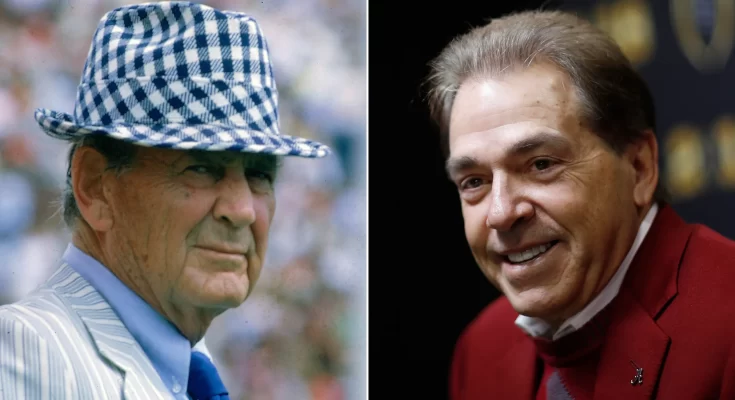ESPN Debates Who Holds the Title as the Most Influential Figure in Alabama Sports History: Bryant or Saban?
The debate over who stands as the most important figure in Alabama sports history has long sparked passionate conversations, but few discussions are as heated and compelling as the one between two coaching legends: Paul “Bear” Bryant and Nick Saban. Both men have left indelible marks on the University of Alabama’s football program, shaping not only the Crimson Tide but also the landscape of college football itself. ESPN recently reignited this conversation, diving deep into the legacies of these iconic coaches to assess who truly deserves the crown as Alabama’s most influential sports figure. The comparison between Bryant and Saban is more than just a tally of wins and championships; it touches on cultural impact, program-building, innovation, and the ways each helped define the identity of Alabama football and, by extension, Alabama sports history as a whole.
To understand the weight of this debate, one must first appreciate the stature and achievements of both men. Paul “Bear” Bryant’s name is synonymous with Alabama football excellence. Coaching the Crimson Tide from 1958 to 1982, Bryant built a dynasty that won six national championships and thirteen Southeastern Conference titles. His impact was not limited to trophies and records. Bryant embodied a rugged, disciplined, and relentless coaching style that came to symbolize Alabama’s football identity during his era. He was more than a coach; he was a cultural icon in the South, inspiring generations with his no-nonsense leadership and fierce competitive spirit. His tenure spanned a time of great social and political change, and his leadership helped unify the state’s fan base and provided a source of pride for Alabama amid turbulent times.
Nick Saban, who took over as Alabama’s head coach in 2007, has elevated the program to unprecedented heights in the modern era. Under Saban’s leadership, the Crimson Tide has claimed seven national championships, including six in just 15 years—a feat unparalleled in recent college football history. Saban brought a meticulous, almost scientific approach to the game, emphasizing details, preparation, and adaptability. He revolutionized recruiting strategies and player development, creating a factory-like environment where elite talent was consistently nurtured into professional-level athletes. Saban’s teams have dominated the SEC, one of college football’s toughest conferences, and have been a constant fixture at the pinnacle of the sport nationally. His influence extends beyond wins, changing how college football programs are run and how the game is coached at the highest level.
When ESPN examines who is the most important figure in Alabama sports history, the debate centers around several key questions: Who did more to build and sustain the program? Who had a greater cultural impact? Who transformed the game itself? And who brought the most national attention and respect to Alabama football?
Bryant’s case is grounded in his pioneering role. When he arrived in Tuscaloosa, Alabama football was not the powerhouse it would become under his tenure. He laid the foundation of the program’s identity and built a winning culture from the ground up. His leadership during the civil rights era was significant, particularly as he recruited the first African American players to Alabama, a bold and historic move that helped break barriers in the South. Bryant’s teams played a rugged style of football that reflected Alabama’s working-class ethos, and his image as the gruff, plaid-jacketed coach became a symbol of tradition and pride. For many, Bryant is the man who put Alabama football on the map and made it a national force. His 323 career wins at Alabama stood as a record for decades, and his six national championships set the bar high for all who followed.
On the other hand, Saban’s supporters argue that his impact is even more profound because he has maintained and expanded Bryant’s legacy in an era of vastly different challenges. College football today is a billion-dollar industry with high stakes, intense media scrutiny, and a constantly evolving competitive landscape. Saban not only kept Alabama at the forefront but also elevated the program to new heights of consistency and dominance. His seven national championships, the most in college football history for any head coach at one school, demonstrate an unparalleled level of success. Moreover, Saban’s approach to coaching—his attention to detail, data-driven game planning, and relentless pursuit of excellence—has influenced coaching philosophy across the sport. He redefined what it means to run a modern college football program, creating a system that other programs aspire to replicate. Saban’s influence extends beyond Alabama; he has shaped college football nationally and even influenced the NFL with his coaching tree.
Another angle to consider is the cultural and social impact each coach had on Alabama and the broader sports community. Bryant’s era was marked by regional pride and tradition. He was a figure who embodied the spirit of the South and gave Alabama fans a sense of identity through football. His success brought hope and unity in a state grappling with economic and social challenges. Bryant’s persona became part of the cultural fabric of Alabama, transcending sports. Saban, meanwhile, represents modern excellence and adaptability. He is a symbol of Alabama’s rise as a global sports brand and its position as a premier destination for elite athletes. His leadership has not only brought success but also helped elevate the university’s national profile in academics and athletics. Saban’s ability to connect with players from diverse backgrounds and prepare them for life beyond football is also noteworthy, making him a mentor and role model.
From a purely statistical standpoint, Saban’s recent dominance cannot be ignored. In just over a decade, he has amassed a level of success that rivals, and in some ways surpasses, any coach in college football history. His teams have consistently ranked among the best, and his influence on recruiting pipelines and player development is unmatched. Yet, Bryant’s historical significance is more than just numbers. His legacy is the blueprint from which modern Alabama football was constructed. Without Bryant’s foundational work, it is arguable that Saban would not have inherited the platform that enabled such success.
The ESPN debate also touches on how each coach’s legacy is viewed by different generations of Alabama fans. Older fans often revere Bryant for his contributions during a formative period in Alabama football history. His name evokes nostalgia and a sense of tradition that is deeply cherished. Younger fans, many of whom have grown up watching Saban’s teams dominate, may view Saban as the definitive face of Alabama football. This generational divide adds complexity to the debate, as it involves not only objective achievements but also emotional connections and identity.
It is also important to recognize the ways each coach impacted the sport beyond Alabama. Bryant’s influence on coaching philosophy and the sport’s culture is widely recognized. His motivational style, emphasis on toughness, and strategic innovations left a mark on college football nationally. Saban’s impact is more evident in the modern era’s technological and analytical approach to the game. His methods have influenced coaching staffs across the country, and many of his former assistants have gone on to successful head coaching careers, spreading his philosophy further.
The question of who is the most important person in Alabama sports history may ultimately be subjective, depending on the criteria one prioritizes. Is it foundational impact or sustained dominance? Is it cultural significance or statistical achievement? Bryant and Saban represent two different eras and two different coaching philosophies, yet both embody the essence of Alabama football excellence.
Both men share a relentless drive for success and a deep commitment to the university’s values. They have each, in their way, defined what it means to be a Crimson Tide coach. Bryant set the stage and laid the groundwork for greatness, while Saban has taken that foundation and built an empire that continues to redefine college football standards.
In considering their importance, it’s also essential to note the ripple effects they have had beyond football. Bryant’s legacy is woven into Alabama’s cultural and social history, symbolizing resilience and pride. Saban’s legacy extends into education, player development, and community involvement, showing a holistic approach to sports leadership.
ESPN’s debate highlights that this conversation is not just about comparing two coaches’ resumes. It’s about understanding how each shaped Alabama sports history in unique and profound ways. It’s a testament to the lasting impact both have had on the university, the state, and the sport of college football.
Ultimately, the debate may not have a definitive answer, and perhaps it shouldn’t. The greatness of Alabama sports history is defined by the contributions of both Bear Bryant and Nick Saban. Each has earned their place in the pantheon of Alabama sports legends through unparalleled success, transformative leadership, and an enduring legacy that continues to inspire players and fans alike.
Whether you root for the tradition and grit of Bryant’s era or the dominance and innovation of Saban’s reign, it is clear that Alabama’s story is inseparable from the stories of these two coaching giants. Their legacies are intertwined, forming the backbone of what makes Alabama football a symbol of excellence and a source of immense pride in the sports world. The ongoing debate only serves to highlight just how monumental their impacts have been—and how deeply ingrained they are in Alabama’s sports heritage.



